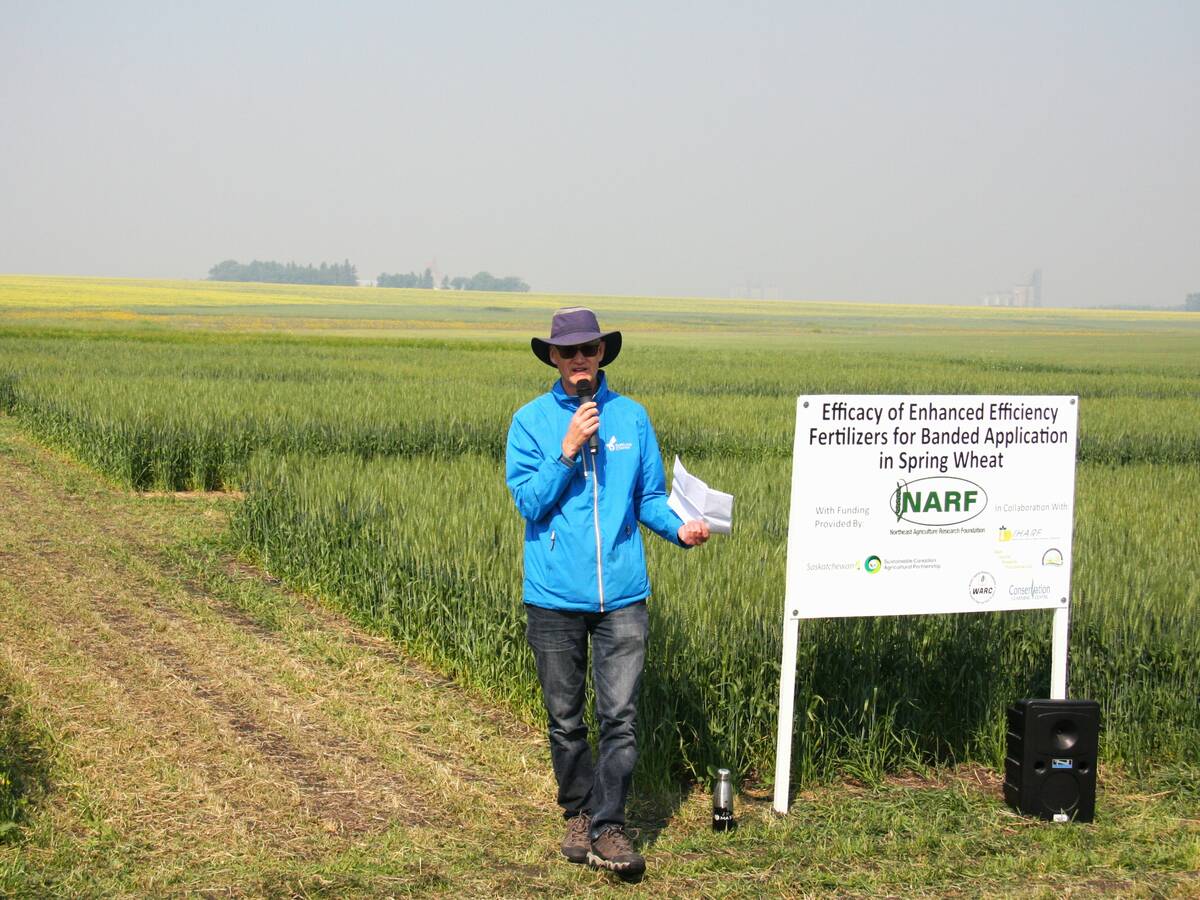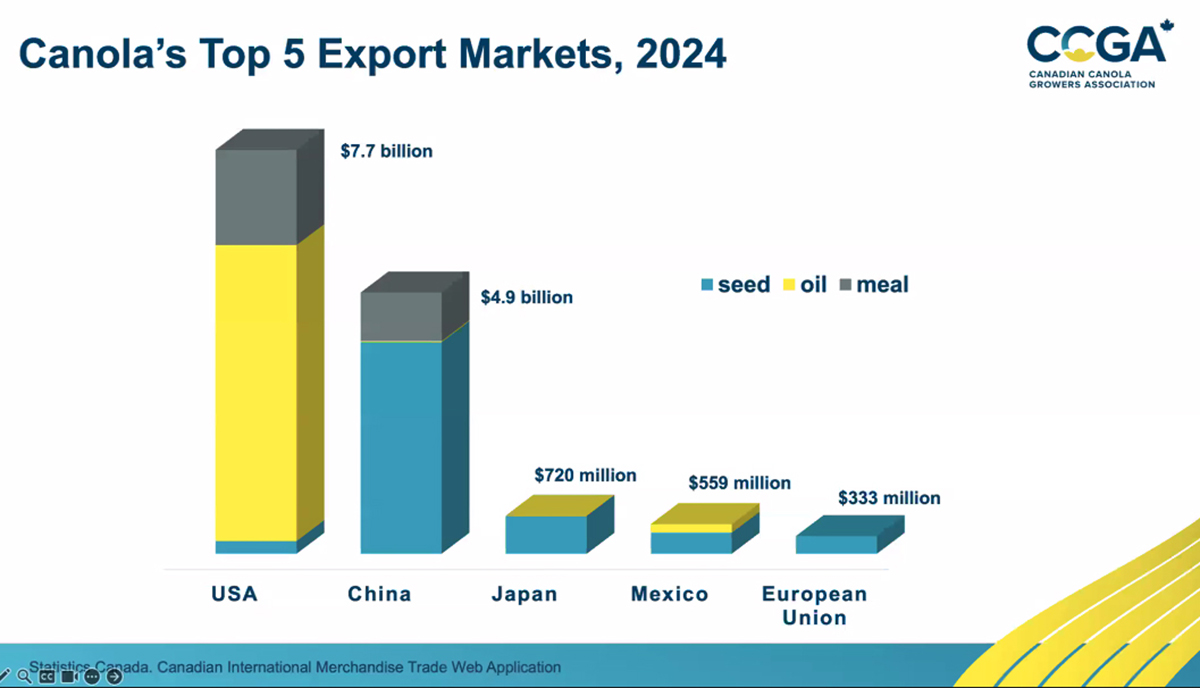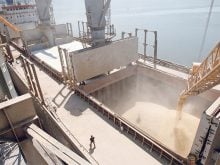SASKATOON — Canada’s canola growers are unimpressed with the federal government’s response to Chinese tariffs on oil and meal.
Ottawa recently announced that it is increasing the compensation rate in the AgriStability program to 90 per cent from 80 per cent and doubling the $3 million payment cap for 2025.
Follow all our coverage of the tariffs situation here
Read Also

Fertilizer method’s link to emissions studied
A researcher says others studying greenhouse gas emissions aren’t considering how the loss of nitrogen into the atmosphere correlates with fertilizer application or if there is an impact to yield.
The announcement is in response to China implementing 100 per cent tariffs on Canadian canola oil and meal and 25 per cent tariffs on certain pork, fish and seafood products.
“Tinkering or attempting to improve business risk management programs such as AgriStability is not sufficient,” said Dave Carey, vice-president of government and industry relations with the Canadian Canola Growers Association (CCGA).
“It’s not appropriate and it will do nothing to sort of make canola farmers and the canola sector whole.”
What the group wants instead is direct financial compensation in the form of cash payments.
Carey said the government owes it to farmers because China’s retaliatory tariffs are in response to Canada implementing a 100 per cent tariff on all Chinese-made electric vehicles and a 25 per cent surtax on steel and aluminum products from that country last fall.
The CCGA and other agriculture groups warned Ottawa in the summer of 2024 that would happen.
“Unfortunately, our (ringing) of the alarm bell fell on deaf ears,” Carey said during a recent webinar hosted by the CCGA.
The government typically uses the Canadian International Trade Tribunal process to make the financial case for such tariffs before implementing them.
But Canada opted not to take that approach, instead following the lead of former U.S. President Joe Biden’s administration.
Carey said the government skipped the tribunal process because Canada does not yet have an electric vehicle industry.
There are federal and provincial commitments and companies making investments, but no manufacturing sector.
It was impossible to prove in a tribunal process that China’s subsidies were damaging Canada’s electric vehicle industry, because there was nothing to damage.
But Canada’s actions were a violation of World Trade Organization rules.
“Canada was, and is, offside with international trade law in their treatment of Chinese imports of particularly EVs, but steel and aluminum as well,” said Carey.
He said Canada is propping up a non-existent industry in Eastern Canada at the expense of a well-established, job-generating industry in Western Canada.
To make matters worse, the government indicated in its 2024 Fall Economic Statement that it is pondering additional tariffs against China.
“We have made our concerns known to both senior politicians and government officials that we simply cannot afford to further antagonize China,” said Carey.

China is Canada’s second-largest canola customer, purchasing $4.9 billion of canola products in 2024.
The oil and meal portion of that trade has been sidelined, but the seed business remains intact, and it is by far the biggest component of the trade.
However, China has also launched an anti-dumping investigation into Canadian canola seed imports. That investigation is ongoing.
China’s Ministry of Commerce has 12 to 18 months to complete the investigation, which was launched in September of 2024.
A recent study shows that Canada stands to lose $1.7 to $4.3 billion in sales in the Chinese market alone due to tariffs.
And then there’s the United States, which is Canada’s top market for canola with $7.7 billion in sales in 2024.
That market is also in jeopardy due to U.S. President Donald Trump’s proposed 25 per cent tariff, which is supposed to take effect on April 2.
The CCGA and other Canadian farm organizations have been busy explaining to U.S. senators, members of Congress and government bureaucrats how important the canola trade is to the U.S. economy.
Canada sold $8.6 billion of canola to the U.S. in 2023. A Canola Council of Canada study shows that canola generated US$11.2 billion in economic activity in the U.S., including supporting 22,000 jobs.
Adding canola meal to dairy rations is increasing milk production in states like California and Wisconsin, while canola oil is being used in the bottling and packaging industry in Iowa and the food processing sectors in Texas and Illinois.
The Canadian Agri-Food Trade Alliance recently hired a U.S.-based lobby firm to help convey that message to American politicians and bureaucrats.
In the meantime, the CCGA and Grain Growers of Canada have been busy lobbying Canadian politicians and bureaucrats to ensure that Canada’s proposed retaliatory tariffs don’t inadvertently further harm farmers by increasing the cost of inputs like fertilizer, crop protection products, seed for sowing and farm equipment coming across the U.S. border.


















